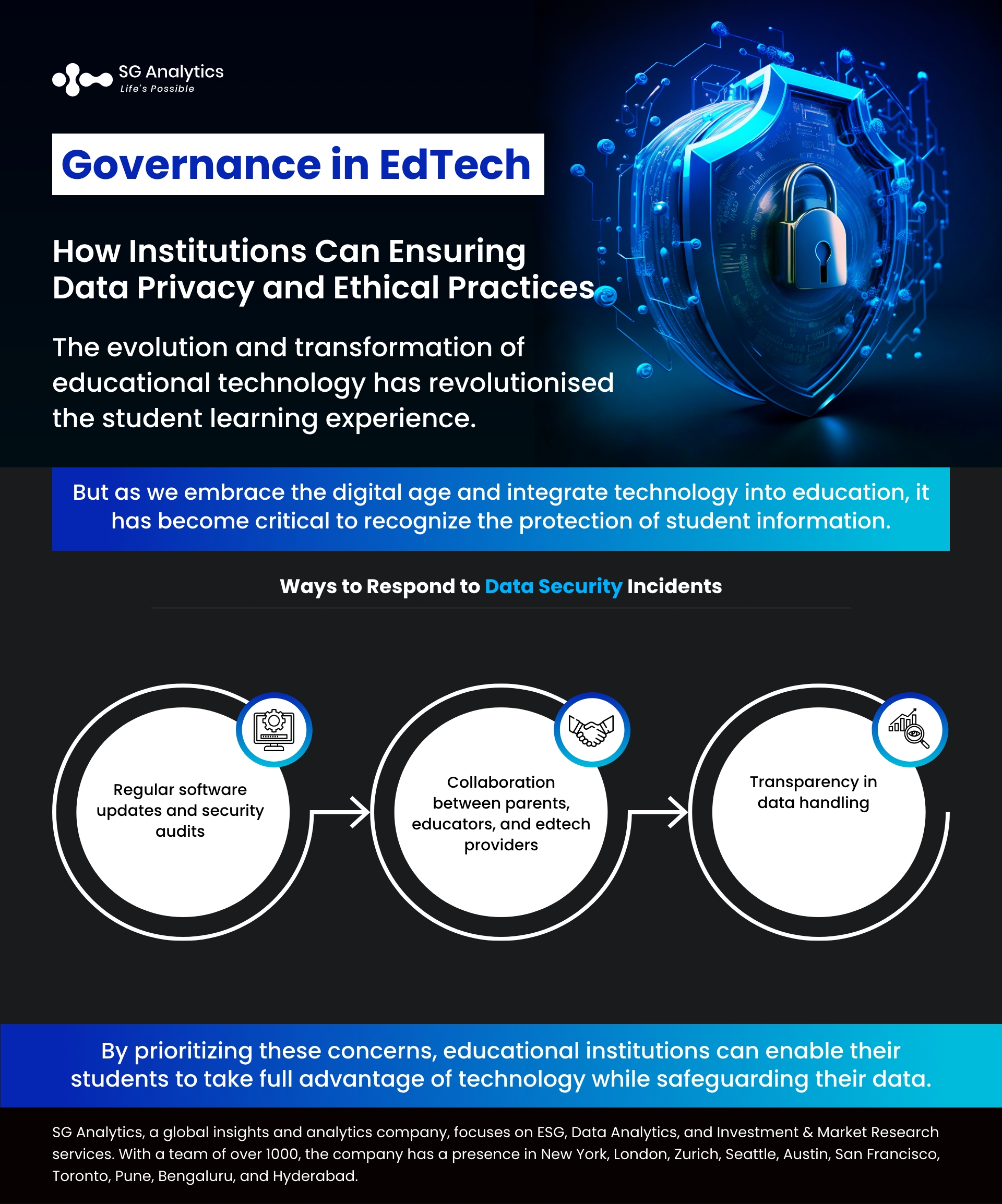In today's technologically driven world, data privacy and security in edtech are not just buzzwords but pillars that uphold the trust and confidence of students, parents, and educators in the modern learning landscape. In the past few years, the edtech industry has undergone a significant transformation. From interactive learning to virtual classrooms, edtech is revolutionizing the way students access information and engage with educational content.
While the integration of technology holds the potential to transform education and improve learning outcomes, it is also raising ethical considerations around data security. These breaches are underlining the importance of implementing robust cybersecurity measures in the digital landscape. By adhering to regulations and implementing robust security measures, institutions are creating a safer and more secure learning environment for students to grow.
Read more: 2023 Forecast: How are Emerging Data Analytics Trends Shaping Edtech Globally?
The Ethics of Edtech
The use of technology in the education sector has become increasingly common with the rise of Edtech products and services. While online education and EdTech companies are making learning more interesting, a significant area of concern is how student data is collected, stored, processed, and potentially monetized. Malicious use of this sensitive data can result in social engineering, financial crimes, cyberbullying, user tracking, or identity theft. And these significant concerns go beyond the operational frameworks.
Amongst their rising concerns, there is a need to address their critical challenges, such as data security, privacy, and ethical issues, and incorporate policies and measures. While schools and institutions are embracing these digital tools, it is becoming imperative to address the challenges and ensure the protection of student data in the digital age.
And with the education industry becoming more digital, there is a growing need to protect student data.

Growing Significance of Data Privacy in EdTech
The evolution and transformation of educational technology, or edtech, has revolutionized the student learning experience. But as we embrace the digital age and integrate technology into education, it has become critical to recognize the protection of student information.
For EdTech companies, student data is a treasure trove of insights to personalize learning experiences, improve educational outcomes, and develop more effective teaching methods. However, many EdTech companies are still indecisive and assume that consent and responsibility lie with the user.
Read more: Big Data Analytics and its Significance for Top Edtech Organizations
Ensuring student data security and privacy has become an immediate concern. Parents and educators are rightfully worried about how student data is collected, stored, and used. The misuse or unauthorized access to this data can lead to critical consequences like identity theft or cyberbullying. Hence, stakeholders in the education ecosystem are now responsible for prioritizing student data privacy and implementing measures for robust security.
The Implications for Students
The use of Edtech solutions is having significant implications for students. In addition to the risks of data security breaches and unauthorized access, there is also an underlying risk of bias in algorithms as well as decision-making.
Edtech solutions can use algorithms to make decisions about a student's performance, like identifying students who require additional support. However, these algorithms can be biased, which can lead to unfair or inaccurate decisions.
Another implication of edtech solutions for students is the potential loss of privacy. Students who use technology to complete assignments and communicate with teachers generate significant data. This data can be used to create detailed student profiles, which can then be used to make decisions about their academic as well as personal lives. This loss of data privacy can lead to significant consequences for students.

Ways to Respond to Data Security Incidents
The rapid innovation in edtech makes it easier for attackers to exploit the expanding surface of IT systems and software. With the adoption of cloud-based technologies, legacy systems' inherent complexity makes it challenging to employ security measures against cyber threats.
The architecture used to leverage the security framework and deliver training for individual learning requires appropriate measures like encryption, multifactor authentication, strong passwords, and secure cloud storage. All are critical for safeguarding sensitive student data.
Read more: Data Analytics is Unlocking New Possibilities in the EdTech Industry. How?
The cybersecurity challenges faced by the edtech industry are multitudinous. Ensuring data security in this rapidly evolving technological landscape has become more complex with the advent of cloud computing, IoT devices, and third-party integration. The creative potential of emerging technologies further outweighs their ability to employ preventive measures against attacks. Edtech providers are now exploring and adopting robust measures to address these challenges to protect student data.
-
Regular Software Updates and Security Audits
With regular software updates, institutions can minimize the potential security risks and design effective contingency strategies that are pivotal for data security. With a well-defined plan, they can avert cybersecurity incidents, such as a data breach or a system compromise. The inclusion of such measures for incident detection, recovery, and communication will enable edtech organizations to respond effectively to security incidents, thereby minimizing the impact on student data and maintaining data trust.
-
Collaboration between Parents, Educators, and Edtech Providers
Collaboration between educators and edtech providers is vital for creating and fostering a safe learning environment for students. Parents and guardians must familiarize themselves with technology and the internet by learning about popular websites among children to address the growing concerns of cyberbullying and potential online predators. Through child safety advocacy groups, parents can gain a clear understanding of the different aspects of online learning.

-
Transparency in Data Handling
Establishing data transparency when handling critical data helps in building trust among students, teachers, and administrators. Sharing critical insights on data storage and use of their data further helps in ensuring the responsible use of data and raising cybersecurity awareness. Edtech platforms are also facilitating their users with resources like privacy guides, tutorials, and workshops as a fundamental component. These educational materials help in covering insights regarding password security, recognizing phishing attempts, and understanding privacy settings. They also help in emphasizing the importance of regularly updating software and applications for security patches and improvements.
Read more: Data-driven Sustainability Initiatives: Harnessing the Power of Data to Drive Change
The Way Forward
The use of technology in the education sector has shown significant potential to transform learning and improve student outcomes. However, it has also presented significant ethical challenges concerning data privacy and security. Educators, administrators, and policymakers are now joining forces and working together to navigate these challenges and protect student data.
Carefully evaluating the existing edtech products and solutions and educating students about data privacy while enforcing new laws and regulations will further help in creating a secure learning environment. By adopting strict privacy standards and compliance frameworks for data security, edtech institutions and organizations can ensure data protection. These measures will also help in demonstrating their commitment to managing and protecting data assets.
As we navigate through the ever-changing edtech landscape, it has become more important than ever to remember that data security and student privacy are critical pillars of an effective digital learning system. By prioritizing these concerns, educational institutions can enable their students to take full advantage of technology while safeguarding their data. In recognition of advancements in the digital age, a concerted effort, as well as a shared commitment to data security, is crucial.

SG Analytics, recognized by the Financial Times as one of APAC's fastest-growing firms, is a prominent insights and analytics company specializing in data-centric research and contextual analytics. Operating globally across the US, UK, Poland, Switzerland, and India, we expertly guide data from inception to transform it into invaluable insights using our knowledge-driven ecosystem, results-focused solutions, and advanced technology platform. Our distinguished clientele, including Fortune 500 giants, attests to our mastery of harnessing data with purpose, merging content and context to overcome business challenges. With our Brand Promise of "Life's Possible," we consistently deliver enduring value, ensuring the utmost client delight.
A leading enterprise in Edtech, SG Analytics focuses on leveraging data management, analytics, and data science to help businesses in EdTech, and other industries discover new insights and craft tailored growth strategies. Contact us today to make critical data-driven decisions, prompting accelerated business expansion and breakthrough performance.
About SG Analytics
SG Analytics is an industry-leading global insights and analytics firm providing data-centric research and contextual analytics services to its clients, including Fortune 500 companies, across BFSI, Technology, Media & Entertainment, and Healthcare sectors. Established in 2007, SG Analytics is a Great Place to Work® (GPTW) certified company and has a team of over 1100 employees and has presence across the U.S.A., the U.K., Switzerland, Canada, and India.
Apart from being recognized by reputed firms such as Analytics India Magazine, Everest Group, and ISG, SG Analytics has been recently awarded as the top ESG consultancy of the year 2022 and Idea Awards 2023 by Entrepreneur India in the “Best Use of Data” category.









